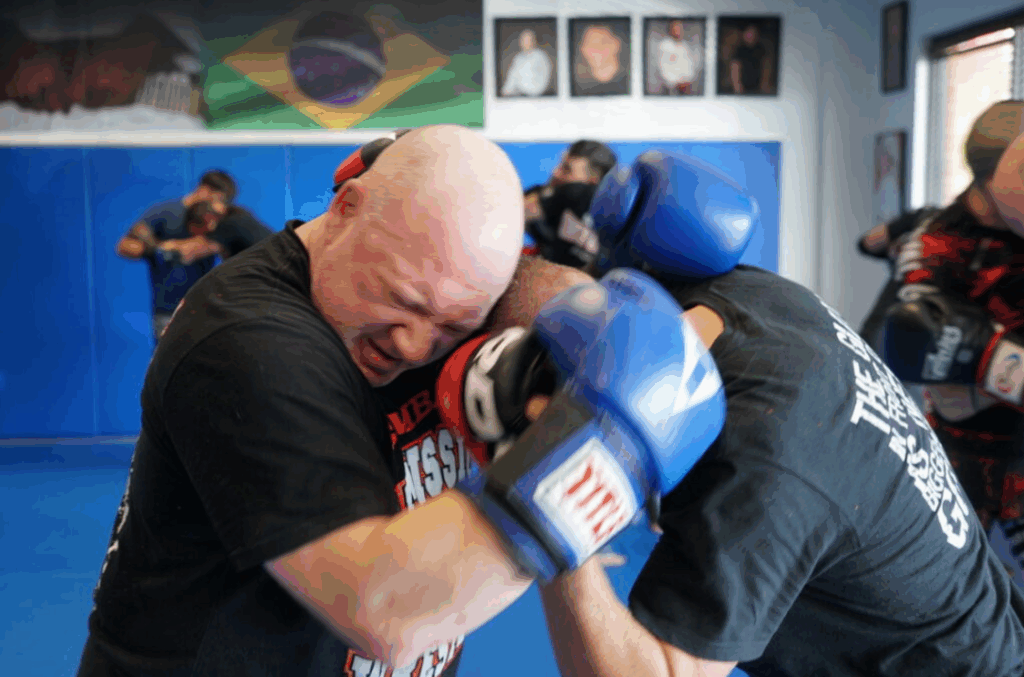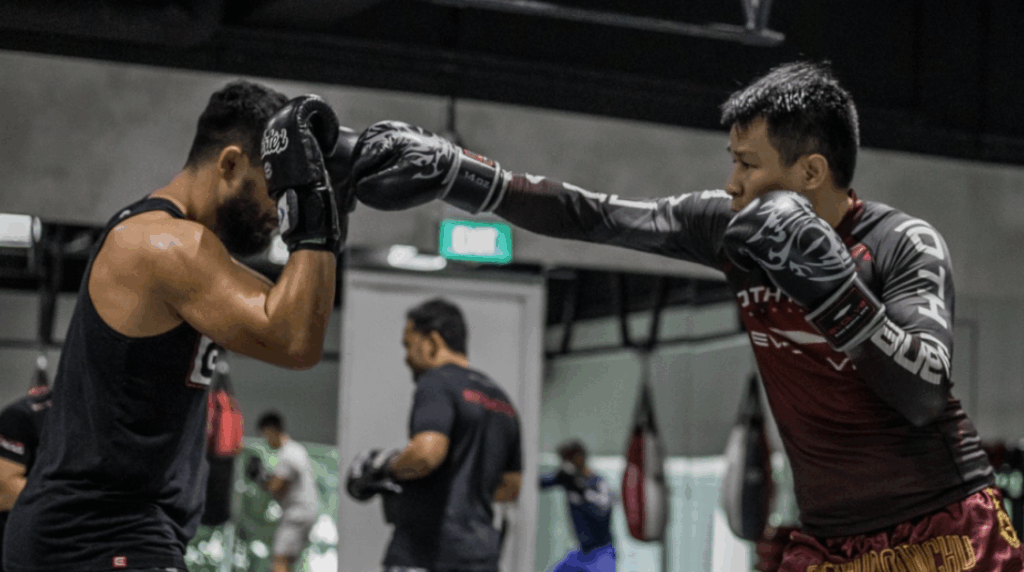To get better fight control, spend 10 to 15 minutes every day visualizing your opponent’s moves and how to counter them. Train in situations that are uncomfortable and like being in a fight, to build your resilience. Add focus drills like closed-eye shadowboxing and controlled chaos sparring to help you get rid of distractions. Use breathing techniques during breaks to reset mentally and maintain clarity.
Train decision-making with scenario-based drills against various styles. The mental edge you develop will become your greatest weapon in the ring.

Developing Psychological Resilience for In-Ring Adversity
When a boxer faces adversity in the ring, their psychological resilience often determines whether they crumble or conquer. You’ll need to cultivate mental toughness through deliberately practicing uncomfortable scenarios during training. It builds cognitive resilience that carries into fight night.
Emotional regulation becomes critical when you’re hit unexpectedly or fall behind on scorecards. Instead of panicking, trained boxers channel that energy into focused execution. Your decision-making under pressure improves when you’ve mentally rehearsed responses to various fight situations.
Focus and concentration must remain intact despite fatigue, pain, or crowd noise. Develop these qualities by incorporating mindfulness practices between intense training sessions. Remember that psychological resilience isn’t innate. It’s a skill you build through consistent practice and deliberate mental conditioning.

Visualization Techniques to Anticipate Opponent Movements
Visualization techniques change how well a boxer can predict and counter their opponent’s movements before they fully develop. You’ll become more aware of what’s going on in the ring by mentally going over certain situations.
Spend 10 to 15 minutes every day picturing how your opponents usually act and then mentally carrying out your counterattacks. This mental training helps you make better decisions when you’re under pressure, which lets you see telegraphed punches a few milliseconds earlier.
To get the best results, use both visualization and tactical discipline by watching fight footage and thinking about how your opponent usually fights. Some advanced boxers even use visualization while they train their bodies, which makes neural pathways that link mental preparation with physical execution. You’re not just thinking about how to succeed. You’re training your mind to see and take advantage of chances when they come up.

Focus Training Methods to Eliminate Ring Distractions
Beyond visualizing opponent movements, a boxer must develop laser-like concentration that filters out distractions during fights. Start by incorporating deliberate focus training methods into your daily routine. Practice shadowboxing focus by maintaining complete mental presence with each punch, tracking imaginary opponents without letting your mind wander.
Implement breathing techniques that anchor your attention. Try counting four seconds in, hold for two, then release for four seconds when distractions arise. This rhythmic breathing resets your mental state instantly. Strengthen your mind-muscle connection by performing technical drills with eyes closed, feeling each movement rather than seeing it.
For eliminating distractions during bouts, gradually introduce controlled chaos in training. Have teammates create noise while you spar, teaching your brain to filter only what matters.

Strategic Decision-Making Under Pressure
The difference between good boxers and great champions is often how well they can make quick decisions when they are under a lot of stress. When you’re tired and punches are flying, your performance mindset is your best weapon. To get better at making decisions, do scenario-based drills that make you change your strategy in the middle of a fight against different types of opponents.
Create a mental framework for ranking threats by importance so you can respond strategically instead of just reacting. To stay calm under pressure, you need to know when to save your energy and when to take advantage of opportunities. The best fighters stay in control of the fight by always thinking about it.
Check the distance, the time, and the patterns of your opponent, and change your tactics in the middle of the exchange. Even when your body is under stress, train your mind to stay analytical. It will give you the mental clarity that champions need in championship rounds.
Mental Recovery Practices Between Rounds and Fights
While physical rest between rounds provides essential oxygen to tired muscles, mental recovery practices often determine a boxer’s ability to maintain fight intelligence throughout a contest. Your 60-second corner break is the perfect time to reset your boxing psychology through deliberate techniques. Focus on controlled breathing to quickly reduce stress and clear your mind for the next round.
Create a consistent pre-fight routine that includes imagining yourself winning and doing specific reaction drills that mimic your opponent’s style. This mental practice uses the same neural pathways that your mind uses during real competition.
Managing stress well between fights keeps your mind sharp and stops you from getting emotionally tired so that you can approach each fight with new clarity and tactical awareness.
Frequently Asked Questions
Can Diet Affect a Boxer’s Mental Sharpness During Fights?
Yes, your diet affects mental sharpness. Proper nutrition fuels brain function, improving focus and decision-making. You’ll maintain clearer thinking during fights when you consume balanced meals with adequate hydration and clean energy sources.
How Does Sleep Quality Influence a Boxer’s Decision-Making Abilities?
Poor sleep impairs your decision-making in the ring, slowing reaction times and clouding judgment. When you’re well-rested, you’ll make faster tactical choices and maintain focus throughout your fights, even under intense pressure.
Are Meditation Apps Effective for Pre-Fight Mental Preparation?
Yes, meditation apps can be highly effective for your pre-fight preparation. They’ll help you develop focus, manage anxiety, and establish mental clarity when used consistently as part of your regular training routine.
Can Music Help Boxers Maintain Optimal Mental Arousal Levels?
Yes, you can use music to regulate your mental arousal level. Upbeat tracks can energize you before fights, while calmer melodies help reduce anxiety. Create playlists tailored to your ideal performance state.
How Do Personal Relationships Impact a Boxer’s Mental Performance?
Your relationships can considerably impact your focus, motivation, and emotional stability. Supportive connections provide strength during training while toxic ones drain mental energy you’ll need in the ring. Balance personal life for peak performance.





